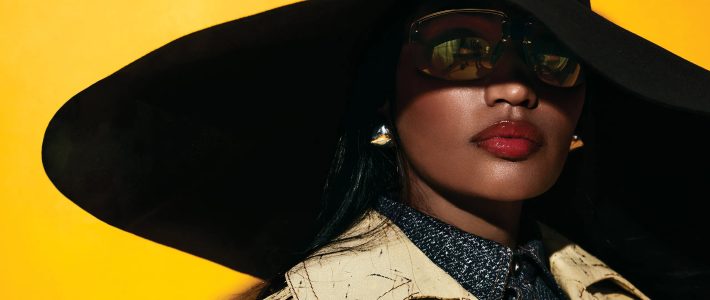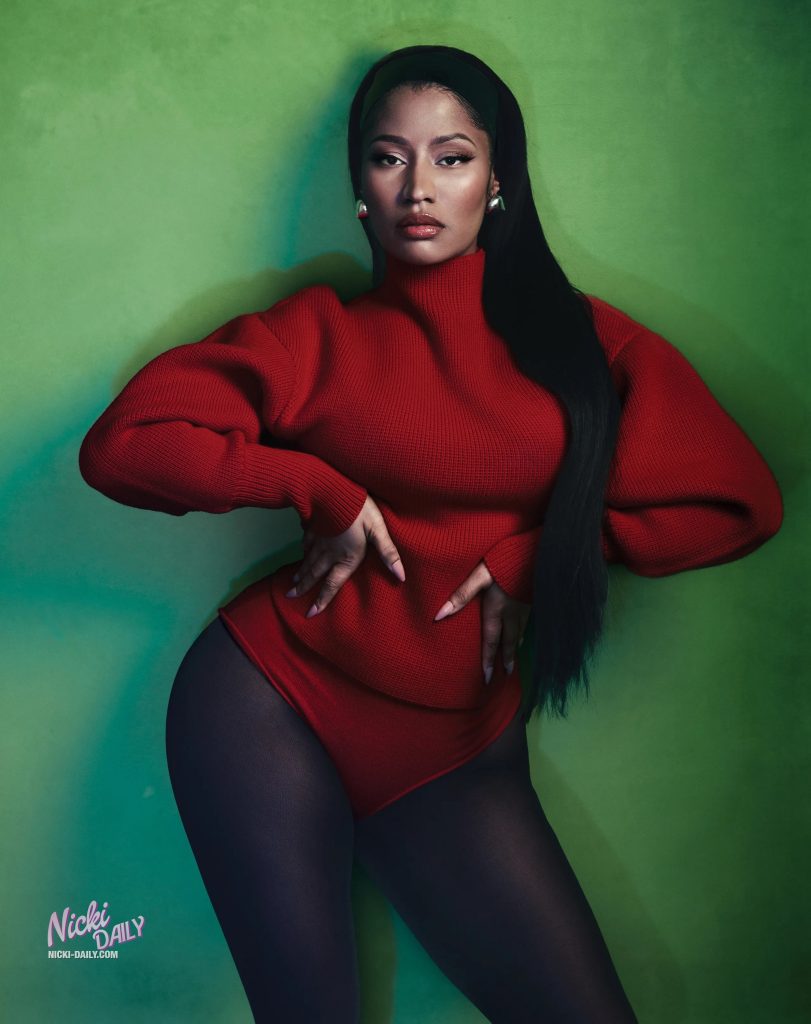BY ROB HASKELL / PHOTOGRAPHY BY NORMAN JEAN ROY / STYLED BY MAX ORTEGA
On an evening in late August, just as Donald Trump is getting booked on 13 felony charges at the Fulton County Jail in Atlanta, a sherbet sunset in the western sky casts Santa Monica Boulevard in a Nicki Minaj–pink blush. But Minaj has no time on this day for politics, nor for the soft summer tints gathering outside the windowless sound booth of a Los Angeles recording studio. She is under pressure to hand over a mastered version of “Last Time I Saw You,” a teaser release from her upcoming fifth studio album, and she is nitpicking.
The verses sounded a bit muffled to her ear, so the team sent the track to a mixer, who brightened up the whole thing. But now it’s ping-y and “radio-ish,” she feels, and she swears she hears an ever-so-slight buzz underneath the beat, though no one else is picking up on it. A scholar of her genre and a rigorous wordsmith, she is also a painstaking listener of her own music; she combs through her recordings, rewrites verses, changes up her tone, adds drums, subtracts them. (There were 27 versions of “Anaconda,” her 2014 hit, before she blessed the single.) She presses her engineers to punch up certain words and ensure that every syllable of her raps is clear and comprehensible. Nicki Minaj wants to be understood. “I’m a bit…particular,” she concedes. “Sometimes things that the best engineer in the world wouldn’t hear, I hear. And you know what? I am always right.”
“Last Time I Saw You” is a strikingly melancholic track for an artist for whom bombast and humor have been the most conspicuous modes. It’s a song about losing someone—a rare layover in the irony-free zone that her fans will remember from “Moment 4 Life,” the breakout love song from 2010’s Pink Friday, her debut studio album. “So the hook is”—she starts singing, softly, her eyes closed—“I wish I’da hugged you tighter the last time I saw you / I wish I didn’t waste precious time the night when I called you / I wish I remembered to say I’d do anything for you / Maybe I pushed you away because I thought that I’d bore you.”
Here is a song steeped in two new, rather adult flavors: regret and uncertainty. “It’s a song about guilt,” she explains. “And I don’t think people make a lot of music about the experience of guilt. But if you talk to any human being on earth about it, they would know exactly what you mean. That ‘I wish I had’ feeling. Once I wrote the hook, I started to think of people that I love and see every day and still take for granted. You know what I’m saying? So I hope the song does a good thing. It’s like, remember how you wish you could have? Well, you can’t. You can’t go back in time. So try to make sure you have different experiences with people that you love. All the grudges, even just being busy and caught up, like when you’re chasing and working and being an adult.” She pauses, and her eyes spin slightly upward, as they often do when she is considering the best way to explain herself. “I’m not saying I want this to be a sad song. Actually I want people to feel happy when they hear it. Happy-sad. Then again, look at Adele. That woman has made me cry a million times, yet I want more.”
Is this the same Nicki Minaj who has so often come in guns blazing, whose catalog of beefs has sometimes cast a lurid shadow over her musical bona fides? Is this the Nicki Minaj who stormed into the mainstream more than a decade ago with a verse promising to eat your brains? Swagger is an essential surface effect in hip-hop, and Minaj, the best-selling female rapper of all time, has worn her crown with especial pomp. (Consider the title of her last album, 2018’s Queen.) As a rapper, she has never allowed for the possibility of a boys’ club, her sexual candor emboldening a generation of women rappers to talk about their body parts with the same vulgar glee as their male peers.
Nicki Minaj—as the Barbz, her fierce fan army, know well—contains multitudes, and it would be facile to suggest that the 40-year-old rapper, who gave birth to a son amid the isolative unease of the pandemic, has retired that old pugilist. She had to fight for everything growing up: for her father’s attention, for her mother’s approval, for material comforts, for the feeling of safety inside the four walls of her home but also in her adopted home country. Pink Friday 2, her new album out in December, was written from the vantage point of a woman who has gotten so many of the things she dreamed about. And yet the past still tugs. The new album asserts in its very title the wish to return to the days when she wrote every track top to bottom and laid her verses over rhythms she plucked off the beat CDs that you could buy on Sutphin Boulevard in Queens. In hip-hop, when you’re as famous as Minaj became after Pink Friday, the other rappers and producers assemble like magi, bearing beats and choruses. Just add a verse and call it your own. (And make no mistake, Minaj has never recorded a rap that she did not author.) “When I look back at a lot of my music, I’m like, Oh, my God, where was the me in it?” she says. “So for this album, I went back to the old game plan.”
Aubry “Big Juice” Delaine, Minaj’s longtime mix engineer, sees an artist more in control of all aspects of the creative process. The lyrics and melodies feel different, somehow, even while they build on the DNA of the records that came before. “Imagine a Nicki Minaj greatest hits album, but all the songs are new,” he says.
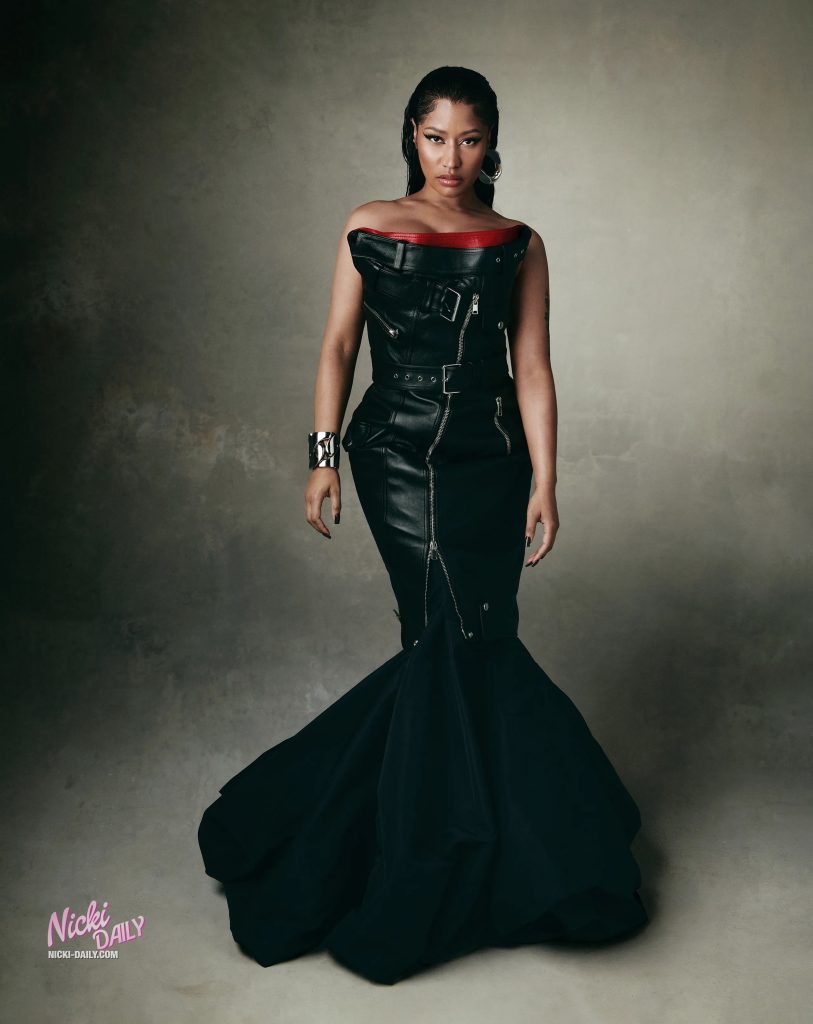
More than in the method of music making, Minaj has been interested in tapping into what she recognizes as a hopefulness that lit up the original Pink Friday, a sensibility that somehow got muddled by the pressures of stardom and the presence of so many cooks with their hands in the sonic stew. She was pleased, recently, to see a retweet of something that Kim Kardashian posted years ago, when that first album was released. It was a line from “I’m the Best,” the intro track to Pink Friday, that went, “I’m fighting for the girls who never thought they could win.” “The idea that saying something like that could give hope to people—that optimistic outlook is something I think I got away from,” Minaj explains.
Fame, success, money, motherhood, the crossroads of middle age—these things may make life complicated, but Minaj would like to be clear that they cannot compare to the challenges she faced before Pink Friday. The three years leading up to her breakout album were, she believes, the most stressful in her life. “Not knowing if you’re going to be broke, not knowing if you’re going to be a failure,” she says, “there’s nothing more complicated than that.”
The sound booth is dark, candlelit, bathed in pinkish light. It’s the vibe Minaj favors for long sessions in the studio. She wears a sheer pink shirt crawling with sequined Chanel logos, blue jeans, and pink Chanel tweed sandals. A Chanel purse with pink PVC windows, a souvenir from the video for “Barbie World,” sits beside her. Her pink nails, with little rhinestone icebergs congregating at the cuticles, are so long that she uses the knuckle of her right thumb to compose text messages. Minaj has a reputation for being protective, even prickly, around journalists, but in fact she is warm, relaxed, open, reflective.
“I think a lot of creators will understand this,” she ventures. “There’s a freeness that you have around you when you’re at your best, when you’re doing your thing at your peak. There’s like this lightness in the air. You’re happy even if you’re writing a sad song. But once you start knowing that you’re being judged, there’s no longer that free spirit. People who excel at something make it look easy, but they also deal with a lot of fear of letting people down and of letting themselves down. Once you make it, it’s like anything you say can be used against you. It’s like when you get arrested—that’s literally what being famous feels like. You go from having this fun, curious nature, laughing and joking, to realizing not everyone gets your sense of humor, not everyone likes you. And they will figure out how to put a negative spin on anything you do. It hurts.”
In September 2019, Minaj posted a tweet that seemed to convey the toll of her success, suggesting that she had had it with the industry and with her detractors: “I’ve decided to retire & have my family. I know you guys are happy now.” The Barbz, momentarily betrayed, went into a frenzy, and the tweet disappeared. But it was obvious that she had soured, for a time, on the business of music. That same year, surprising fans who may have expected one of her rumored liaisons with famous rappers (Drake? Eminem?) to prove true, she married Kenneth Petty, a high school flame with a checkered past who had grown up a few blocks from her in Queens and was part of a big group of teenagers who gathered at the same pizza place after school. He has always and only called her Onika (Nicki was born Onika Tanya Maraj, in Trinidad, and Minaj was a stage name that she was pushed by a manager to adopt). He was, importantly, unimpressed by the hard, dazzling shell of her fame, and he offered a tether to the old days.
“Because I’ve known my husband for so long, there’s an ease we have with each other,” she explains. “We make each other laugh. We’re silly. And we’re always reminiscing about some old story. If it was a guy that I met as Nicki Minaj, I think I’d feel like they liked me because I’m Nicki Minaj, and what if I don’t look like Nicki Minaj every day? And that, combined with pregnancy, would probably have made me crazy.”
Marriage and motherhood promised to be escapes, after all, from Nicki Minaj the brand. “I think that deep down inside, I believed that once I had a family, I would just lose the desire to make music,” she says. “I would always tell people, ‘Watch, when I have a child I’m going to cook every meal for him and bake cookies every day.’ Maybe subconsciously I hoped my focus would just be on being a mother, and I looked forward to that idea. It felt like a relief. But what happens is that you find out you have to work.”
Minaj has not publicly revealed the name of her son, whom she prefers to call Papa Bear. She and Petty navigated his infancy with no help whatsoever save for an occasional brief visit from a grandparent. She never felt so exhausted in her life, even on her three world tours. She remembers the atmosphere of commiseration that pervaded her marriage at the time. “I’m not going to lie, things got testy between us,” she recalls. “Because of our history, I think we knew we’d get past it. But there’s no such thing as confidence in parenthood. I kind of wish that someone had told me—although I’m sure I wouldn’t have been able to understand it—that there’s a level of anxiety, and you think it’s going to go away, but in fact it gets scarier. So often you think: I don’t know how to do this!”
At times, the public-facing Minaj has seemed like a land mine of emotions ready to detonate all over the Twitter-verse. Motherhood has tested her patience, and she finds that she is passing. She tells me a story about meeting a woman who thought of herself as the world’s best homemaker. Her house was immaculate, the food was perfect, the children had no hair out of place. But little by little the woman noticed that her self-esteem derived solely from her children’s accomplishments, or from a sense of superiority to other mothers. She started to feel guilty about not working, and, defying a chorus of skeptics, she put herself through nursing school. And then, as a nurse, she started to feel guilty for working, for missing precious moments in her children’s lives. “I was like, OMFG,” Minaj recalls. “She felt guilt when she was doing the perfect homemaker thing, and guilt as a working mom when she missed a moment in their lives. Maybe God let that lady say that to me because it made me think, Well, if I’m going to have mom guilt regardless, I might as well continue doing the only thing I know how to freaking do, which is make music.”
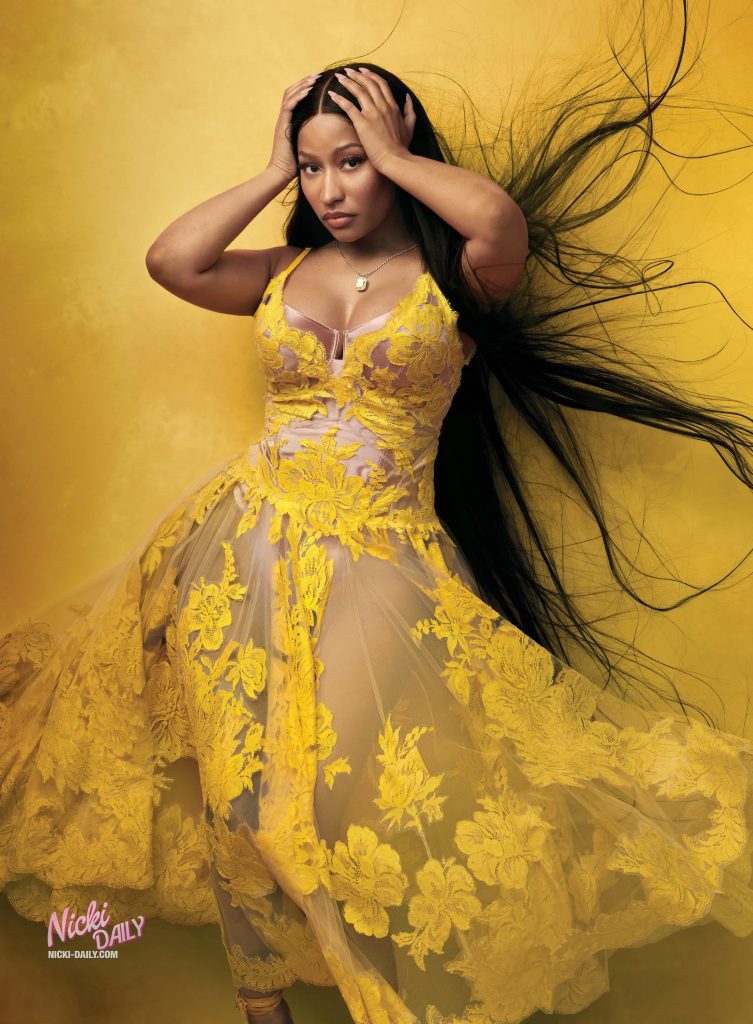
It is well known that Minaj had a difficult childhood. When she was three years old, her parents left Trinidad for New York, leaving her under the care of her grandmother, in a house crowded with aunts, uncles, and cousins. Two years later, settled in South Jamaica, Queens, her parents collected her and her older brother. The family was poor, and she felt it keenly. “You figure out the value of money when you come from a different country, and then you don’t have what the other kids have,” she recalls. “Children know a lot more than you think regarding poverty.” She remembers a time in fourth grade when every girl suddenly had a certain pair of $50 Fila boots. “A girl I considered a friend of mine—in front of all these people—looks at me and says, ‘You think your mother could afford that?’ When you hear things like that, you put them somewhere in your subconscious, and you make yourself a promise.”
Minaj, who grew up attending a Pentecostal church with her mother, remembers a prayer that she delivered as a young child, one of her earliest memories. She believes she was just five years old, months after she had moved to the US. Her mother had embraced the prevailing soap operas of the day, and Days of Our Lives was flickering through the static of her parents’ bedroom television, though no parents were around. She remembers understanding that the show was being acted, that people like her, who enjoyed pretending and being silly, were playing the parts, and that maybe she could play a part and change her life. She got down on her knees and said, “God, please make me rich so I can buy my mother another house and take care of my family.”
In the 1980s, crack cocaine ravaged families, especially Black families, across America’s big cities. Minaj’s late father moved from weed to adding crack to his weed, and then to crack on its own. He drank a lot and was sometimes violent, once setting his own house ablaze with his wife inside. Minaj feels that her mother never understood his addiction at a time when drug users were experiencing peak Reagan-era stigma. “I think about watching my father go back and forth, and I just wish that at the time I understood that he wasn’t doing it because he wanted to,” she says. “I thought that he was making a conscious effort to be addicted to a drug that would have him steal his children’s video games and sell them for money. Think about that—who would make a conscious effort to do that? Now I realize, those people weren’t making those choices because they wanted to hurt their family. Addiction took over their bodies and their lives. They were victims too.”
By the time she was 11, possessed of that special confidence that sometimes bubbles up from chaos, Minaj felt that she could run the house better than the grown-ups. “I had adult burdens way too early,” she recalls, “but I had tunnel fucking vision.” She knew she wanted to be an actress and attended the LaGuardia performing arts high school. She remembers feeling so impatient to get out there and audition, certain that she would be a success. “I literally told everybody that by the time I turned 19, I would be just as famous as Halle Berry and Jada Pinkett, and no one could tell me any different. So when I went to auditions and didn’t get parts, I was shocked. I would sit by the phone thinking, I know they’re gonna call; everybody’s gonna love me and see how great I am. I didn’t get one callback. But at the same time I was like, Eff this shit, I need money.”
She waited tables, famously getting fired from three separate Red Lobsters for discourteous treatment of customers. She worked as an office manager. And she began writing raps and performing with local musicians. In her early 20s she was uploading those performances to Myspace, which got her some attention from industry executives. This led to a collaboration with the rapper Lil Wayne, who worked with her on several mixtapes, essentially homemade albums that she used to sell out of a little white BMW she had saved up for. She became a sensation in the underground hip-hop world, and in 2009 Wayne signed her to his label, Young Money. With the original Pink Friday a year later, she became a star.
Minaj never went in for partying, and because of her father’s difficulties, as a very young woman she was apt to wag a finger at her girlfriends for smoking marijuana. They used to tease her in turn at nightclubs for nursing a single cocktail and swearing she was drunk. But she takes care to say that she does not place herself above her old friends. “I feel like I will always consider myself to be just like my father,” she says. Years ago, while briefly living in Atlanta to advance her music career, she was prescribed Percocet for painful menstrual cramping. It was enormously helpful, until she found that she was taking the medication even when she wasn’t in pain. “No one told me that this was a narcotic and this was addictive. Luckily I was able to ground myself. But—once an addict, always an addict. I feel like if you’ve ever experienced addiction to anything, which I have, you always have to think twice and three times about the choices that you make.” She believes that the risk of substance abuse is especially high among those who live under a microscope. “Look at some of our biggest celebrities. They eventually either get laughed out of wanting to go outside anymore, like Michael Jackson, or criticized, like Whitney Houston, or they fight silent battles, like Prince. These are some of the greatest of all time. And one day they decided, ‘You know what? I’d rather self-medicate and be in my own world.’ ” Minaj seems to be accounting for the scar tissue amassed around her relationship with the press. “Should you keep on doing interviews and pouring out your heart so people can laugh? No.”
“I think of ‘Nicki Minaj’ more like the Superman suit—who you change into when you go into the telephone booth”
Minaj was taken with The Last Dance, the 2020 Michael Jordan documentary, in which the basketball great spoke candidly for the first time about some of his teammates and rivals—taking full advantage, it seemed to her, of the impunity that attends retirement. “I realized that Jordan made the right decision by biting his tongue earlier, when he was in the game,” she says. “If I could go back and maybe save some of those things I said for later, like Jordan did, yes. Maybe I would have. Maybe I should have. I don’t know.” She pauses and rolls her head back. “Most people don’t want to hear you talking all day anyway. People want the art you offer. Somehow now I look back, and I think about the things that I used to care about, the things that used to ruin my day, and I can’t believe I let those miscellaneous things stop me from focusing. For sure that’s progress, right?”
A month later, Minaj has just returned to Los Angeles from New York, where she hosted the MTV Video Music Awards, and is stealing a few hours at home before heading back to the studio. The newly built house, modern and vast, which she bought last year, sits in a gated enclave in Hidden Hills. Papa Bear seems thrilled to be back; he is bouncing on the white sofa in the home theater or crawling through the hallway, and Minaj crawls after him, both of them laughing the whole way. She has little time at home these days, but a mini recording studio in the guesthouse helps. Minaj has become a better cook than she ever thought she would be, and she finds a kind of solace in making dinner for her family (Trinidadian stewed king fish or spicy sausage pasta for the grown-ups, yellow rice for her son, who is, for now, repulsed by his mother’s more highly seasoned dishes). “Cooking actually makes me more calm,” she says. Minaj is happier than she has been in the past, and she credits no magic pill or self-help book or guru but simply a shift in perspective.
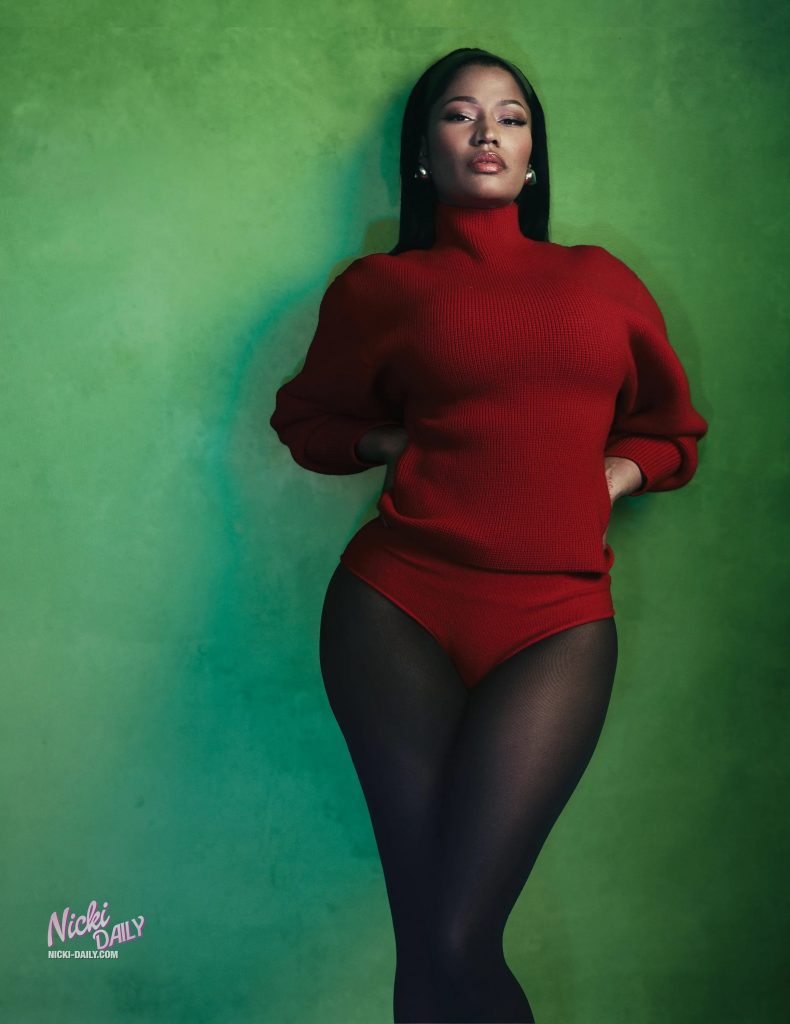
“When you look around and try to keep yourself in a grateful frame of mind,” she explains, “the things that you can be thankful for seem to start adding up, and you realize that in the big scheme of things, most of the stuff you would have complained about is so trivial. It’s been a constant race. But then you stop and realize, there’s nothing to run around for. That’s the thing that’s changed in me. It’s not that I’ve taken these amazing steps. It’s just about finally being happy with who you are as opposed to where you are.”
Minaj has been thinking about how she might make the best use of a massive platform that has been a place for connecting with her fans and at times for engaging in public tussles. She has 28 million followers on X (formerly Twitter) and nearly 10 times that many on Instagram, and yet she has always insisted that social media is something she would swear off in a heartbeat if it weren’t a necessary feature of the business of being Nicki Minaj. She has consistently urged her fans to stay in school and is a huge believer in higher education. She has been an exponent of body positivity since the beginning of her career, vaunting her own curves and urging women of color, especially, to feel proud of theirs. She does not pretend that this has always been easy for her personally, by the way. “I just looked at a video that I posted on Instagram when I was 25, and I would fucking pay to look like that right now,” she says. “But today I can say that I’m at peace with who I am and how I look. I have to say this as a Black woman, though. I’ve made certain choices for my son, to not give him sweets and candy and juices, because of illnesses like diabetes that run in our community. I’m not in favor of body positivity if it means unhealthy bodies. That’s bull. It’s not believable, so let’s stop pretending. Recently I had to get a breast reduction, and actually I love it. I used to want a bigger butt, and now I look back and realize how silly that was. So—love your curves, and love your non-curves. There’s nothing wrong with any of it.”
She felt rushed, after her pregnancy, to snap back into shape, and she wishes she could take this pressure off future moms. Lately she has been wondering how to use social media to connect with more mothers, to exchange lessons and stories. “There are questions that you can’t just google,” Minaj explains. “Every day a mom has to wake up and be a supermom no matter what they’re faced with.” She would also like to bring more attention to mental illness and, especially, drug addiction. “It’s gotten so easy to be alone physically, where young people spend 12, 16 hours a day in their rooms on their phones, looking at these false realities, comparing themselves,” she says. “I’ve seen artists gone way too soon, and I wonder if that could have been avoided if they’d just had the chance to talk about what they were going through.“
“I’ve had a lot of time to figure myself out. The idea of accepting what you can’t change—it just never clicked with me before. Now I understand”
A foray into COVID policy has likely been Minaj’s greatest public misstep, though she may not view it that way. In a 2021 tweet she urged her fans to do research of their own into the vaccine after the friend of a cousin of hers in Trinidad allegedly became impotent following vaccination. She was swiftly criticized by fans, peers, and members of the media who felt that her circumspection was anti-scientific and might sow distrust in health and public policy experts. Not chastened, exactly, Minaj maintains a leery independence, though she is now less likely to shout it from the rafters. “I’m one of those people who doesn’t go with a crowd,” she says. “I like to make my own assessment of everything without help from everyone.” While she has spoken out against police abuses of power and in favor of universal health care, she has been reluctant to align herself with a political party. “Every time I talk about politics, people get mad. I’m sorry, but I am not going to be told who I should get on social media and campaign for. There’s a lot we don’t know that’s going on in the government, and I don’t think it changes whether you lean to the left or right.”
Of all the notions about her that have permeated the public consciousness and gone on to form a theory of Nicki Minaj, the one that rankles her most, she says, is that idea that she is not nice. Minaj has often had important messages to deliver—her indignation over what she perceived as MTV’s reluctance to celebrate videos that feature anything but slim women’s bodies, leading to a famous feud with Miley Cyrus, comes to mind—only to find herself policed for failing to deliver those messages in dulcet tones. “When I hear the word mean, I think about the core of who the person is,” she explains. “I always tell people that the difference between being mean and being a bitch is that bitch passes. Bitch comes and goes. Mean is who you are. I could be the biggest bitch, at the height of my bitch-ness, but if the person I may be cussing out at that time needs something from me, I’m going to give it to them. I have to be able to look in the mirror and be okay with myself.”
Throughout her music career, Minaj has played with alter egos, marshaling those old theater chops in the service of creating characters—the ingenue Harajuku Barbie; the hot-tempered, gay, and British Roman Zolanski, to name just two. It’s tempting to think of Nicki Minaj herself as the über–alter ego of Onika Maraj, though she regards it differently. “I think of her more like the Superman suit, like who you change into when you go into the telephone booth,” she explains. “They’re completely different entities.” Recently she and her husband tried out a nanny for the first time, and Minaj remembers telling a couple of her girlfriends about an incident that occurred in which Papa Bear, who she says gets his dance moves from his father, had a fall. Minaj’s initial reaction was that the nanny ought to have been there to catch him. And she told her friends how the nanny, with the conviction of a seasoned surrogate parent, corrected her, explaining that kids fall, and it’s okay. “They all looked at me thinking that I was going to be out for blood!” she remembers. “I was like, Do you all think that Nicki Minaj is the same person I am with my child’s nanny? As a matter of fact, I didn’t say anything.”
Marc Jacobs, a fellow shape-shifter who has had Minaj in the front row of his shows over the years, appreciates the challenge of maintaining a self that is separate from one’s art. “It’s interesting to see how creative people and their creative output grow and evolve at different stages of their lives,” he says. “I’ve had the good fortune of meeting some incredible performers over the years, and a lot of them say that what you see onstage or in the press is not who they are. When someone like Nicki reveals a different side, it gives her a lot of depth. But it shouldn’t be a surprise when people mistake you for Nicki, if that’s all you’ve shown them.”
Minaj plays me another track from the new album called “Big Difference,” which she wrote several years ago but recently found herself falling back in love with. On the face of it, the song may seem like a familiar flex: The “big difference” is the gulf between Minaj and other rappers, in particular those who come casually into the game, get lucky with a hit on TikTok, and suddenly imagine that fame and clout are their right rather than the outcome of years of hard work. Minaj put in the work, and if she feels you haven’t, she is apt to let you know it. But it’s hard to imagine that the rapper, so deliberate with her pen, wasn’t hinting at other big differences as well.
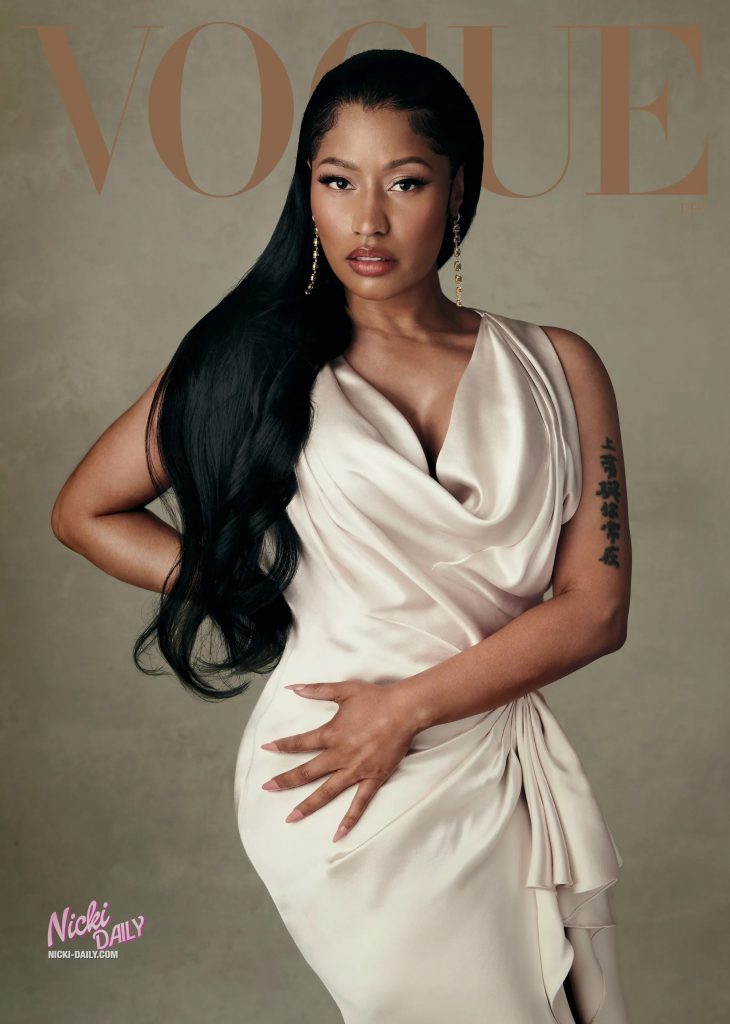
“You know that feeling when you unlock one of the secrets of life?” she asks. “For me the idea of accepting what you can’t change—it just never clicked with me before. You want to have control over everything, but that’s the easiest way to be unhappy. So now, if I find myself trying to control it all, I try to remember what’s really important. I look in my son’s face, and my whole soul lights up. He has no clue how nerve-racking it’s been for me to be a mother and an artist.”
At home, there’s so much to fight for and so little to fight against. In the last few months, Papa Bear has started to make a strange new sound. Initially his mother couldn’t figure out what it was, until she realized that he was learning to ape her laugh, with its big staccato yuk-yuks. Minaj has always had her imitators, but this one is a little different.
In this story: hair, Lacy Redway and Dionte Gray; makeup, Raoúl Alejandre. Produced by Boom Productions. Set Design: Viki Rutsch. Photographed at Untitled NYC.
